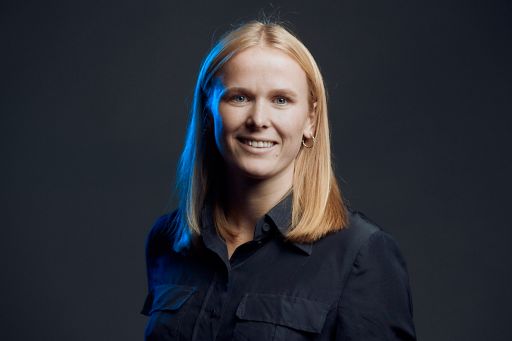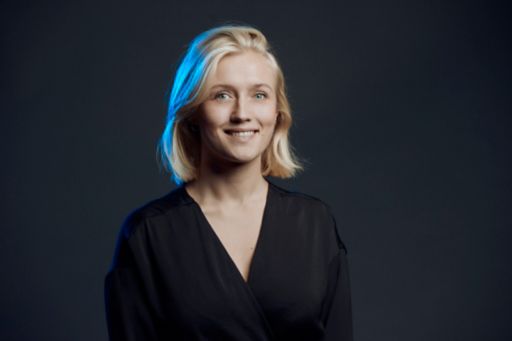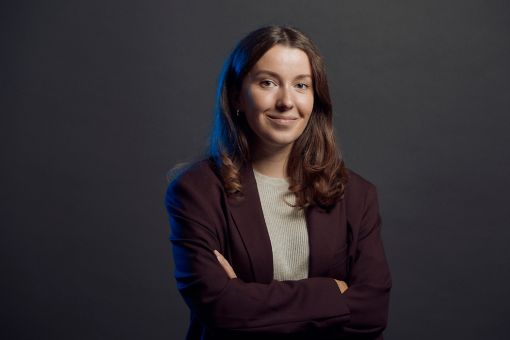At KPMG in Denmark, we have a lot of female talent - and some of them work with the world's most advanced technological solutions that have the potential to fundamentally change our everyday lives. Close to every third employee in our NewTech department is women, and in this article, you can meet four of them.
Kristine drives our work with blockchain technology

If you want to help shape the future, you must understand and work with new technology, and this is why I chose to work within this field. As a Business Analyst and functional process architect I am, among other things, responsible for driving our work with blockchain technology.
Blockchain has the potential to fundamentally change the way individuals and businesses exercise trust towards each other. We see completely new opportunities for traceability, contracts and transactions that will save time, optimise risk management, and lower costs. But it is also a technology that is quite new and implementing it will require a lot from many companies. Therefore, we work a lot to educate decision-makers about the technology and support them in identifying good use-cases.
Once this is done, the aim is to carry out controlled pilot projects to ensure that the technology is the right one to solve the current problem.
You should not put a given technology into play if it does not make sense. Instead of looking for a problem that can be solved with blockchain, you need to analyse a problem and go for the technology that solves the problem best.
This is done by making sure that the people who have the problem actually understand the technology and what it can do. In this way, you will also ensure a more representative input, which in turn provides more robust, comprehensive, and responsible models and solutions.
Sacha is fascinated by the democratization of technology
Change, development, and new discoveries have always fascinated me. Some of the things that change our world the most are new technologies, which is why my inner compass and curiosity have naturally led me towards that field - first during my studies and later professionally.
Especially the democratization of technology. The fact that the masses have the possibilities, and that people with relatively few resources can create genius inventions, is to me exciting and life-affirming.
With (almost) infinite possibilities of application, there is a risk that technology will be misused, used unethically or directly harm individuals and society. Therefore, I have a strong focus on governance and the responsible use of artificial intelligence, to ensure that the development of new systems happens according to a premise that we can also live with tomorrow. Regulation of the area is on its way, but in an exponentially developing field, it is difficult for the legislation to keep up. This is what we try to help companies navigate.

Anne educates companies in the use of quantum tehcnology

I have always been very curious about the world and how things work, which is why I ended up studying physics at university, where I became interested in quantum mechanics and quantum technology.
After finishing my master's degree, I decided not to go directly into research, and therefore I applied for a job at KPMG. Here I get to experience how quantum technology can be used in the private sector, while also helping create a link between research and the industry.
My tasks range a lot, from technical tasks such as implementing models on quantum-inspired software and actual small, early quantum computers, to training companies in quantum technology. In addition to educating companies about the opportunities and risks associated with quantum computing, I also help our clients identify use cases for quantum technology in their business.
In a society that is becoming more and more digitised, classical computers cannot keep up with requirements regarding data volumes and faster solutions – here the quantum computer can be crucial. Quantum computers can simulate ground-breaking and complex molecular and protein structures in the pharmaceutical industry and solve complex problems regarding the optimisation of energy resources.
In addition, quantum technology creates the possibility of more secure encryption during communication and data transfer, which is of great interest in the telecommunications and financial sectors. In order to take advantage of these opportunities, it is important that companies and governments are educated and made familiar with quantum technology already now, and this is where KPMG comes into the picture.
Valeria uses technology to help fulfill companies' sustainability goals
I have always been a very curious person who has never turned down a challenge, and this has been one of the reasons for starting a career in machine learning. Here I have the possibility to develop solutions that make a real difference to the individual companies and society as a whole.
We have just finished building a machine learning solution that optimises ships' fuel consumption and minimises their CO2 emissions. Solutions based on artificial intelligence (AI) and machine learning can help both the Danish and global shipping industry to reduce CO2 emissions, and therefore these technologies will be crucial in order for companies to meet their sustainability goals.
AI and machine learning give companies the opportunity to become greener and more efficient through analysis tools that can predict and anticipate different scenarios. Such solutions can also help reduce energy consumption, reduce production breaks, or optimise inventory planning.

